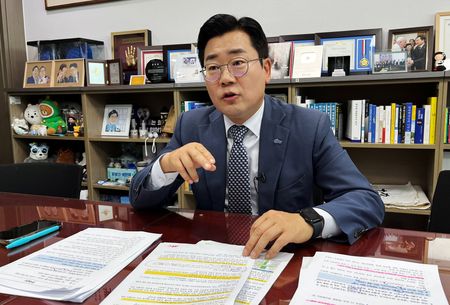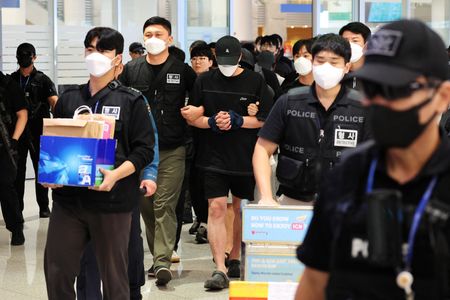By Ju-min Park and Joyce Lee
SEOUL (Reuters) -South Korean police are seeking to detain most of the 64 South Koreans repatriated from Cambodia over allegations they were involved in online scams in the Southeast Asian country, the police said on Monday.
The police have filed requests to the courts to detain 58 of the repatriated citizens, while one is already held in custody, they said in a statement.
The United Nations says the scam centres, which emerged in Southeast Asia during the COVID-19 pandemic and target victims around the world with phone and online scams, generate billions of dollars in revenue every year for criminal networks.
It estimates hundreds of thousands of people are working in the centres, some lured with the promise of a well-paid job but many forced to do so under threats of violence.
The South Koreans' return to Cambodia on Saturday followed the death of a South Korean student who was lured to Cambodia for what he thought was a high-paying job.
'DESPERATE YOUNG PEOPLE'
Park Chan-dae, a lawmaker who helped rescue 16 South Koreans in August and September, many in their 20s and 30s, said crime organisations were exploiting vulnerable people desperate for work.
"What is intertwined here is desperate young people with a lack of economic opportunities, " Park told Reuters in an interview.
Family members of three of those 16 South Koreans reached out to Park's office, pleading for help rescue their loved ones, Park said.
"We were able to save them miraculously because they were brave, took risks and communicated with us, not done through some kind of system," said the lawmaker from the ruling Democratic Party, adding the victims secretly shared their location information with him.
South Korea has issued a "code-black" travel ban for parts of Cambodia over recent increases in cases of detention and "fraudulent employment".
The government has also set up a taskforce to help nationals lured into working in scam compounds and secure the release of those held against their will.
The returnees, who were arrested in Cambodia in recent months, are implicated in various crimes linked to voice phishing, romance scams and "no-show" fraud schemes, according to police.
"No-show" scams are a new kind of fraud where scammers make large reservations or take advance payments under a false identity and disappear with the money.
South Korean Foreign Minister Cho Hyun said on Monday Cambodian police had arrested about 10 more South Koreans and rescued two who had been held against their will, and that the government would beef up consular support in the country.
SURGE IN KIDNAPPING, MISSING PERSONS' CASES
Britain and the United States last week sanctioned the Cambodia-based Prince Group, a multinational network accused of operating vast online scam operations that trafficked people to defraud victims from around the world.
The British government said the centres, located in Cambodia, Myanmar and across Southeast Asia, used fake job adverts to lure workers who were then forced to commit online fraud under the threat of torture.
Scam operations in Cambodia are estimated to have about 200,000 workers, including 1,000 South Koreans, according to estimates from South Korean officials.
Park, the lawmaker, said the number of reports on kidnapping and missing persons in Cambodia jumped to 330 cases between January and August this year, from 17 cases in 2023, referring to government data.
"The police plan to thoroughly investigate all allegations surrounding the Cambodian scam compounds," the police said, including the kidnapping or detention of South Koreans.
The police said they were also checking on claims that four of those returned from Cambodia at the weekend were locked up and beaten by the criminal organisations running the scam compounds.
(Reporting by Ju-min Park, Joyce Lee; Editing by Kate Mayberry)









